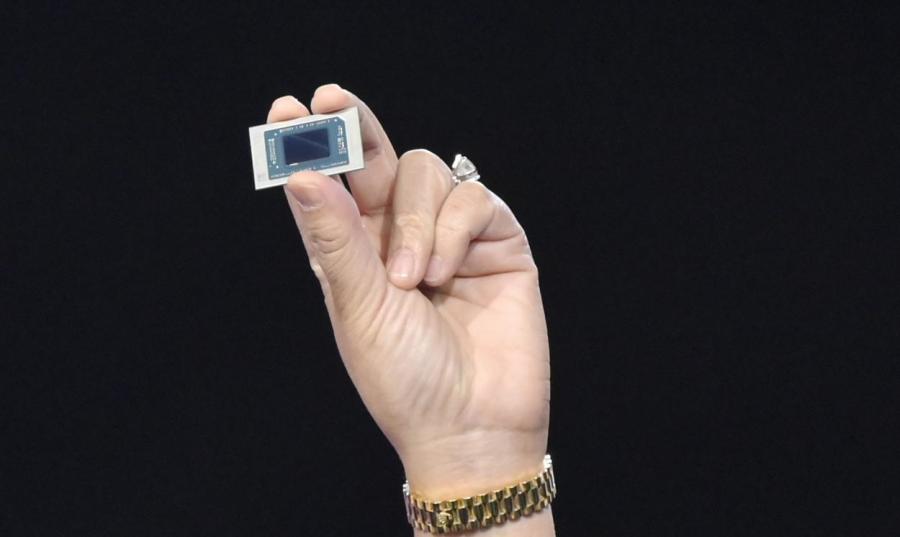Illustrative image, showing the ADM Ryzen 7040 series chips displayed at CES 2023 at the Venetian Hotel in Las Vegas, Nevada on January 4, 2023. (Getty Images)
[People News] In China, the media is still hyping the DeepSeek myth, but the excitement has noticeably waned. It has already disappeared from trending searches, and the initial wave of enthusiasm has receded—only nationalist internet users ("little pinks") are left exposed on the beach. Outside the Great Firewall, DeepSeek’s so-called "innovation" is being unmasked as blatant plagiarism, and its fate has taken a dramatic turn for the worse. In just 24 hours, DeepSeek has plunged from the sacred heights of technological paradise into the abyss of communist intellectual property infringement. What was once hailed as an AI originality miracle has been exposed as yet another tedious, large-scale fraud.
DeepSeek is like a patriotic anti-American TV drama that skyrocketed in popularity upon release, only to be abruptly canceled. The Chinese Communist Party (CCP) portrayed it as the tale of an unknown mathematical genius and private equity mastermind, aided by a gifted AI prodigy and a team of fresh-faced tech elites from top universities. These individuals, having never set foot outside China, were raised under the ideological constraints of CCP education. Yet, standing on the artificially painted peak of nationalist-driven tech innovation, they seemed to defiantly and inclusively release a so-called open-source codebase. Without years of scientific accumulation, without the incremental progress of research and development, without ever facing failure or setbacks, and without the backing of massive capital and a sound institutional environment, this team—barehanded and stripped of resources—allegedly managed to tear apart Silicon Valley’s tech giants and Wall Street’s financial elites from across the ocean. The entire "divine creation" process left no visible traces or audible signals, only to suddenly erupt at a singular moment into a mushroom cloud of CCP propaganda. The Chinese internet was filled with sensationalist media blasts, while nationalist users indulged in self-congratulatory euphoria. Meanwhile, Western media reacted with alarm, likening it to an AI "Pearl Harbor" or another "Sputnik moment."
This formula is all too familiar—it is precisely Beijing’s favorite model for a "Great Leap Forward" in technology. The CCP seems incapable of learning its lesson, always picking the worst possible areas to provoke the West. This time, it chose technological innovation, its weakest link. And yet, the lifespan of this "East rising, West declining" tech fantasy lasted less than 24 hours. A global crackdown, investigations, and technology bans now appear inevitable. The CCP may soon be facing a reckoning.
David Sacks, the U.S. AI director under President Trump, stated that there is substantial evidence showing that DeepSeek relied on "distilling" OpenAI’s model data to develop its own technology. According to Bloomberg, sources familiar with the matter revealed that U.S. officials are investigating whether DeepSeek bypassed American export controls by acquiring Nvidia’s advanced semiconductors through a third party in Singapore. An anonymous insider disclosed that the White House and the FBI are also probing whether DeepSeek purchased Nvidia chips—banned from sale to China—via intermediaries in Southeast Asia. Reports suggest that DeepSeek may have illegally obtained Nvidia’s high-end H100 chips through Vietnam. The Financial Times reported that OpenAI has accused DeepSeek of illegally using its proprietary model to train its own open-source competitor. Both OpenAI and Microsoft are investigating whether DeepSeek engaged in intellectual property violations.
Alexandr Wang, CEO of U.S. firm Scale AI, stated that DeepSeek may possess as many as 50,000 Nvidia H100 chips for developing its current model. However, due to U.S. export control measures, such matters cannot be openly discussed. Billionaire Elon Musk also commented on related posts on social media platform X, adding "obvious," signaling his agreement with the allegations. Some netizens questioned how DeepSeek could afford such a massive operation, noting that each H100 chip costs around $40,000, making 50,000 chips worth a staggering $2 billion (approximately 14.6 billion RMB). They questioned where Liang Wenfeng’s hedge fund, High-Flyer Quant, obtained such vast funds.
In a July 2023 interview with Chinese tech media 36Kr, DeepSeek founder Liang Wenfeng responded to why DeepSeek V2 had surprised many in Silicon Valley: "They are surprised because this is a Chinese company entering their game as an innovator. After all, most Chinese companies are used to following rather than innovating." He further claimed, "China inevitably needs someone to stand at the forefront of technology."
Recently, Liang Wenfeng asserted that DeepSeek chose an open-source approach to uphold the ecosystem of technological innovation rather than for commercial purposes. However, his statements appear highly inconsistent. If DeepSeek’s purpose wasn’t commercial, why did Liang choose to operate through High-Flyer Quant, a private investment firm? High-Flyer Quant, founded in 2015, emerged during China’s so-called "chip Great Leap Forward" era. If Liang had been committed to technological innovation, he could have pursued it back then—so why didn’t he? In late 2021, High-Flyer Quant suffered poor performance, with over 100 of its products declining by more than 10%, resulting in severe investor losses. In July 2023, Liang established Hangzhou DeepSeek AI Fundamental Research Co., claiming to have a team of 136 young tech talents from top universities. However, assuming an average annual salary of 500,000 RMB per employee, just the labor costs alone would amount to 68 million RMB per year—far beyond High-Flyer Quant’s financial capabilities. Liang’s claim that DeepSeek’s large-language model training only cost $5.6 million is simply absurd.
Additionally, online users have uncovered that DeepSeek’s corporate ownership structure is unusually complex. Hangzhou DeepSeek AI Fundamental Research Co. is entangled in a web of four layers of holding companies. The upper-tier consists of: Ningbo Cheng’en Enterprise Management Consulting Partnership; Ningbo Chengpu Business Consulting Co., Ltd.; Ningbo Chengxin Rouzhao Enterprise Management Consulting Partnership. Meanwhile, the lower-tier includes only one entity: Beijing DeepSeek AI Fundamental Research Co. Among all these companies, Liang Wenfeng holds approximately 83.37% of the total shares, making him the de facto owner. But why has he structured the ownership in such a convoluted manner? And why are so many of these companies based in Ningbo? Possible reasons include tax evasion, creating an escape route in case of legal repercussions, or enabling undisclosed capital flows. In any case, the hidden motives behind these arrangements remain highly suspicious. Recently, Chinese media have subtly started hyping Alibaba’s AI as a competitor to DeepSeek. Whether this internal shift is linked to Premier Li Qiang remains unknown. If so, Li Qiang’s move may have disastrously backfired.
According to Reuters, DeepSeek’s accuracy rate is only 17%, significantly lower than that of popular Western AI software. In short, it is neither original nor advanced. Additionally, many users have reported that DeepSeek is nothing more than a blatant rip-off of OpenAI.
On X (formerly Twitter), the account "Li Laoshi is not your teacher" exposed an incident where a user on January 29 asked DeepSeek to revise a research paper. Shockingly, DeepSeek’s suggestions were identical to those provided by ChatGPT—including the format. Even more suspiciously, the user stated: "It gave me feedback on my previous version of the paper, but I never provided it with that version. The chapter structure had completely changed. Where did it get my earlier draft?"
"Li Laoshi is not your teacher" also reported that a Japanese user tested DeepSeekR1 by asking it to write an erotic novel. The AI refused, stating: "This violates OpenAI’s policy." When the user input the same prompt, the response was identical to OpenAI’s output.
Another X account, "Quantum Leap," remarked: "Is Wall Street’s supposed fear of DeepSeek just another ‘water-into-oil’ scam? Or a high-budget version of the Hanxin fraud?" Beyond Elon Musk and Scale AI founder Alexandr Wang, OpenAI’s Chief Scientist Mark Chen also believes that DeepSeek’s reported development costs have been vastly exaggerated—possibly by a factor of 100. A journalist has suggested the cost claims were overstated to mislead investors. Wall Street billionaire Bill Ackman has raised concerns that Liang Wenfeng, the hedge fund boss behind High-Flyer Quant—who is accustomed to profiting from stock market manipulation in China—may have spread false information to short-sell stocks for financial gain. If this is true, the implications could be serious.
Despite the CCP’s realization that the situation is deteriorating, its efforts to downplay the DeepSeek controversy may be too little, too late. Fraudsters cannot simply walk away without consequences. A storm may be on the horizon. The CCP’s reckless actions may soon come back to haunt it.
(First published by People News)










News magazine bootstrap themes!
I like this themes, fast loading and look profesional
Thank you Carlos!
You're welcome!
Please support me with give positive rating!
Yes Sure!